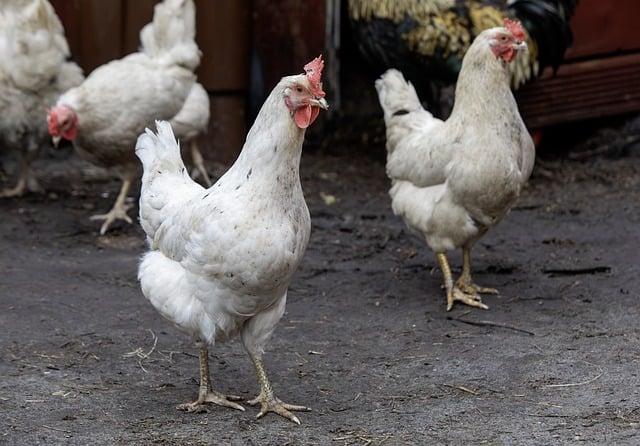Once, a loving dog owner named Sarah decided to treat her furry friend, Max, to a steak dinner. Unbeknownst to her, the rich, seasoned meat was harmful to dogs. After indulging, Max faced a night of distress, suffering from an upset stomach. This experience taught Sarah a vital lesson: not all meats are safe for dogs. Foods like bacon, ham, and seasoned meats can lead to serious health issues. To ensure your dog’s well-being, always choose safe, vet-approved options. Protect your pet—know what they should never eat!
Contents
- Understanding the Risks of Toxic Meats for Dogs
- Identifying Common Meats That Are Harmful to Your Pet
- Safe Alternatives: Choosing the Right Proteins for Dogs
- Expert Recommendations for a Balanced Canine Diet
- Q&A
Understanding the Risks of Toxic Meats for Dogs
When it comes to our furry companions, ensuring their health and well-being is paramount. Unfortunately, not all meats are created equal, and some can pose serious risks to dogs. Certain types of meat can contain harmful substances or be prepared in ways that are detrimental to a dog’s health. Understanding these risks is essential for every pet owner who wants to provide a safe and nutritious diet.
One of the most concerning meats for dogs is **raw or undercooked pork**. This type of meat can harbor parasites such as Trichinella spiralis, which can lead to a serious condition known as trichinosis. Symptoms can range from gastrointestinal distress to more severe complications affecting the muscles and nervous system. Additionally, processed pork products like bacon and ham are often high in sodium and preservatives, which can be harmful to dogs.
Another meat to be cautious about is **beef**, particularly when it comes to certain cuts or preparations. Ground beef can sometimes be contaminated with E. coli or Salmonella, both of which can cause severe illness in dogs. Furthermore, fatty cuts of beef can lead to pancreatitis, a painful and potentially life-threatening condition. Always ensure that any beef given to dogs is lean and well-cooked to minimize these risks.
Lastly, **chicken bones**—especially when cooked—can splinter and pose a choking hazard or cause internal injuries. While chicken itself can be a healthy protein source, the bones should always be avoided. Instead, opt for boneless, skinless chicken that is thoroughly cooked. By being mindful of these potential dangers, pet owners can make informed decisions that prioritize their dog’s health and happiness.
Identifying Common Meats That Are Harmful to Your Pet
When it comes to our furry companions, not all meats are created equal. Certain types of meat can pose serious health risks to dogs, and it’s crucial for pet owners to be aware of these dangers. For instance, **raw or undercooked meats** can harbor harmful bacteria like Salmonella and E. coli, which can lead to severe gastrointestinal issues. Cooking meat thoroughly eliminates these risks, but some meats should still be avoided altogether.
Another meat to steer clear of is **pork**, particularly when it is raw or undercooked. It can contain a parasite known as Trichinella, which can cause trichinosis in dogs. Even cooked pork products, such as bacon, can be problematic due to their high-fat content and potential for pancreatitis. Additionally, processed pork products often contain seasonings and preservatives that can be harmful to your pet.
**Certain fish** also fall into the category of meats that should be avoided. Fish like salmon, when raw, can carry a parasite called Neorickettsia helminthoeca, which can lead to salmon poisoning disease. Even cooked fish can be risky if it contains bones, as these can pose choking hazards or cause internal injuries. It’s essential to be cautious and consult your veterinarian before introducing any fish into your dog’s diet.
Lastly, **lamb** and **beef** can be problematic for some dogs, especially those with food sensitivities or allergies. While many dogs can tolerate these meats, they can also trigger adverse reactions in others. It’s important to monitor your pet’s health and consult with a veterinarian if you notice any signs of discomfort after feeding them these meats. Always prioritize your dog’s well-being by choosing safe and appropriate food options.
Safe Alternatives: Choosing the Right Proteins for Dogs
When it comes to selecting the right proteins for your furry friend, it’s essential to prioritize their health and well-being. While many meats are safe and nutritious, certain types can pose serious risks. Understanding which proteins to avoid can help you make informed decisions that keep your dog happy and healthy.
**Certain meats, such as raw or undercooked pork, can harbor parasites like trichinella, which can lead to severe health issues.** Additionally, meats like beef and lamb should be sourced from reputable suppliers to avoid contamination. Always ensure that any meat you provide is cooked thoroughly to eliminate harmful bacteria. Remember, the quality of the protein is just as important as the type.
**Some common meats, like chicken and turkey, are generally safe but can cause allergies in some dogs.** If you notice any signs of discomfort, such as itching or gastrointestinal upset, it may be time to explore alternative protein sources. Consider options like fish, which is not only safe but also rich in omega-3 fatty acids, promoting a shiny coat and healthy skin.
**In addition to traditional meats, there are several plant-based protein sources that can be beneficial for dogs.** Ingredients like lentils, chickpeas, and quinoa can provide essential amino acids without the risks associated with certain animal proteins. Incorporating a variety of protein sources into your dog’s diet can help ensure they receive a balanced and nutritious meal plan, tailored to their specific needs.
Expert Recommendations for a Balanced Canine Diet
When considering the best diet for your canine companion, it’s crucial to understand which meats can pose health risks. Certain types of meat can be harmful to dogs, leading to serious health issues. To ensure your furry friend thrives, it’s essential to avoid the following:
- Raw or Undercooked Pork: This can contain parasites like Trichinella spiralis, which can cause severe gastrointestinal distress.
- Processed Meats: Items such as bacon, ham, and sausages are often high in salt and preservatives, which can lead to obesity and other health problems.
- Fatty Cuts of Meat: Meats with high-fat content can lead to pancreatitis, a painful and potentially life-threatening condition.
- Certain Fish: Fish like salmon can carry parasites that are harmful to dogs, especially if not cooked properly.
In addition to avoiding specific meats, it’s important to consider how meat is prepared. Cooking methods can significantly impact the safety and nutritional value of the meat you offer. For instance, grilling or baking meat without added fats or seasonings is a healthier option compared to frying or using sauces that may contain harmful ingredients.
Moreover, always be cautious about the source of the meat. Opt for high-quality, reputable suppliers to ensure that the meat is free from harmful additives and contaminants. Organic and grass-fed options are often better choices, as they tend to have fewer chemicals and a higher nutritional profile.
remember that a balanced diet for dogs should not consist solely of meat. Incorporating a variety of vegetables, grains, and healthy fats is essential for providing all the necessary nutrients. Consulting with a veterinarian or a pet nutritionist can help you create a well-rounded diet tailored to your dog’s specific needs, ensuring they remain healthy and happy.
Q&A
-
Can dogs eat raw meat?
No, dogs should avoid raw meat due to the risk of bacterial infections such as Salmonella and E. coli. Cooking meat kills harmful bacteria, making it safer for your pet.
-
Is it safe for dogs to eat pork?
Pork can be problematic for dogs, especially if it is undercooked or contains bones. Undercooked pork may harbor parasites like Trichinella, while bones can splinter and cause internal injuries.
-
What about processed meats?
Processed meats, such as bacon, ham, and sausages, are high in salt and preservatives, which can be harmful to dogs. These ingredients can lead to health issues like obesity and pancreatitis.
-
Are there any meats that are toxic to dogs?
Yes, certain meats like beef and lamb can be safe, but the way they are prepared matters. Avoid feeding dogs any meat that is seasoned with garlic or onion, as these can be toxic and lead to serious health problems.
safeguarding your dog’s health is paramount. By avoiding harmful meats like bacon, raw pork, and certain bones, you ensure a longer, happier life for your furry friend. Make informed choices and prioritize their well-being today!

大家好,我是彼得潘,專業的手法身體治療師。我喜歡探索和研究各種主題,並透過與人工智慧的合作分享專業、實用、有趣的文章。我們定期進行人工審核,以確保內容的準確性。如果您發現文章中有任何不準確的地方,請隨時與我們聯繫,我們會及時糾正。您可以透過 [email protected] 與我們聯繫。



